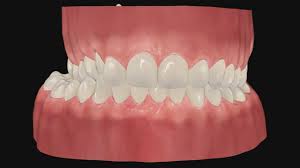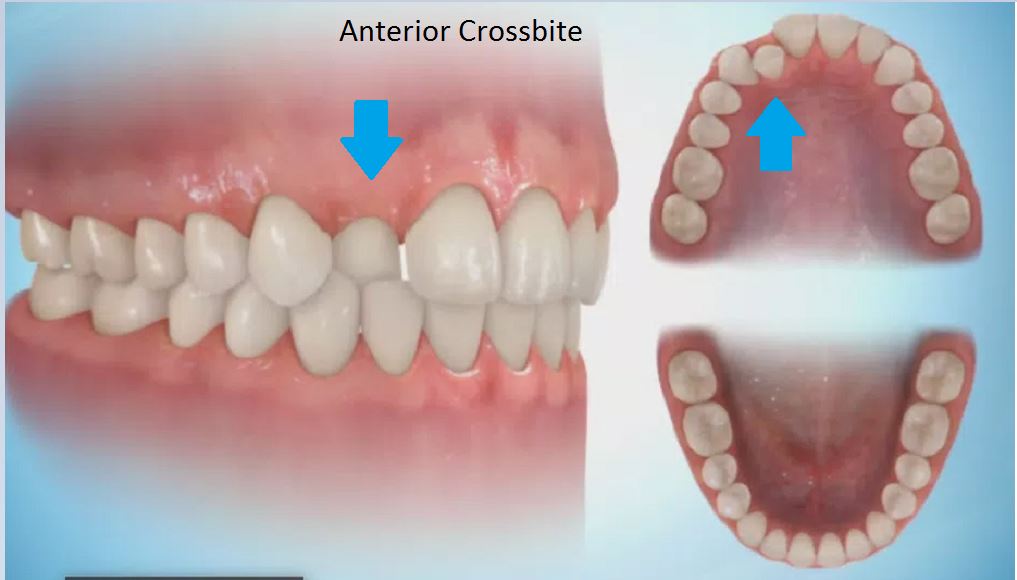What is a Crossbite? Causes, Effects, and Treatment
When it comes to bite misalignment, crossbites are one of the most common, yet often overlooked, orthodontic issues. A crossbite occurs when the upper teeth bite inside the lower teeth instead of outside, as they should. This can happen with a single tooth or a group of teeth, and it can affect the front (anterior crossbite) or the back (posterior crossbite) of the mouth.
While it may not seem like a big deal at first, untreated crossbites can lead to serious oral health problems, including jaw pain, tooth wear, and even gum disease. Thankfully, crossbites are treatable with the right orthodontic care. In this post, we’ll explore what causes a crossbite, its effects on your health, and the best treatments available.


What Causes a Crossbite?
Several factors can contribute to the development of a crossbite. These include:
Genetics: Much like other dental issues, crossbites can run in families. If parents or siblings have a crossbite, there's a higher likelihood that children will develop one too.
Delayed or Abnormal Tooth Eruption: Sometimes, baby teeth fall out too early, or adult teeth take longer than expected to emerge. This can lead to misalignment in the bite.
Thumb Sucking or Prolonged Use of Pacifiers: Habits such as thumb sucking or extended use of pacifiers beyond infancy can alter the natural position of teeth and lead to crossbites.
Mouth Breathing: Chronic mouth breathing due to allergies or other nasal obstructions can affect jaw development, leading to bite misalignment.
Misaligned Jaw Growth: Uneven or improper jaw growth can result in an upper or lower jaw that is larger or smaller than the other, contributing to a crossbite.
Effects of a Crossbite on Oral Health
While a crossbite may not cause immediate discomfort, it can lead to several long-term issues that affect both dental and overall health:
Jaw Pain and TMJ Disorders: When the teeth do not align properly, it places extra stress on the jaw muscles, leading to jaw pain and, in severe cases, temporomandibular joint (TMJ) disorders.
Tooth Wear and Damage: Crossbites cause abnormal pressure on certain teeth, leading to uneven wear and, eventually, tooth damage. Over time, this can result in broken or chipped teeth.
Gum Recession: Crossbites can push certain teeth outward or inward in unnatural ways, which can lead to gum recession and even gum disease over time. This increases the risk of tooth loss.
Difficulty Chewing and Speaking: Misaligned teeth can make it harder to chew food properly or speak clearly, affecting daily life and self-confidence.
Facial Asymmetry: In severe cases, an untreated crossbite can cause the facial muscles to develop unevenly, leading to noticeable facial asymmetry.
How is a Crossbite Treated?
The good news is that crossbites are highly treatable with the right orthodontic care. Depending on the severity and the patient’s age, there are several options available:
Braces: Traditional braces are often the most effective treatment for correcting a crossbite, especially in younger patients. Braces apply pressure to gradually shift the teeth into the correct position.
Clear Aligners (Invisalign): For adults or older teens seeking a more discreet option, clear aligners like Invisalign can be used to treat mild to moderate crossbites. These custom-made trays gradually move the teeth into place.
Palatal Expanders: If a child’s upper jaw is too narrow, a palatal expander can be used to widen the upper arch and correct the bite. This treatment is typically recommended for younger patients since the bones are still growing and more flexible.
Surgical Options: In severe cases where the crossbite is due to jaw misalignment, orthognathic surgery may be needed to reposition the jaw and correct the bite. This is typically only required in extreme cases.
Elastics or Rubber Bands: Sometimes, rubber bands are used alongside braces or clear aligners to improve bite alignment and ensure the upper and lower teeth fit together properly.
Why See an Orthodontist for Crossbite Treatment?
While general dentists can offer some orthodontic treatments, seeing a specialist like an orthodontist ensures that your crossbite will be addressed with the highest level of care and expertise. Orthodontists have additional years of specialized training that equip them to diagnose and treat bite issues like crossbites.
At Strouse Orthodontics, we have extensive experience in treating crossbites in both children and adults. Early treatment can help prevent more severe problems down the road, so don’t hesitate to schedule a consultation. We’ll develop a customized treatment plan to give you a healthy, well-aligned smile.
Conclusion
A crossbite is more than just a cosmetic concern—it can impact your dental health and overall quality of life. If you or your child has a crossbite, it’s important to seek treatment early to avoid complications. Whether you need braces, clear aligners, or another orthodontic solution, Strouse Orthodontics is here to help. Contact us today to learn more about your options and start your journey toward a healthy, beautiful smile.
